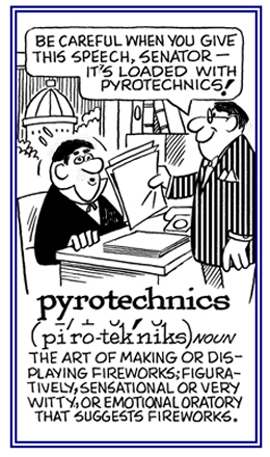pyro-, pyr-
(Greek: fire, burn, burning, heat, produced by heating, hot; and sometimes also referring to "fever as shown at this link")
pyrosphere, barysphere, magmosphere
The zone of a layer of the earth below the lithosphere, consisting partly of magma.
pyrospheric
A reference to the layer of the earth below the lithosphere, consisting partly of magma.
1. A thermostat that operates at very high temperatures: There was a pyrostat integrated in the new stove Susan had which regulated the supply of heat she wanted to use for cooking.
2. An automatic sensing device that triggers an alarm or extinguisher if there happens to be a fire: The pyrostat started instantly when the flames broke out in the kitchen of Mary's house.
2. An automatic sensing device that triggers an alarm or extinguisher if there happens to be a fire: The pyrostat started instantly when the flames broke out in the kitchen of Mary's house.
pyrotechnian
A producer of, or someone who presents, fireworks.
pyrotechnic
1. Of or pertaining to fireworks, or the art of making or managing them; of the nature of a firework.
Also more widely, capable of being ignited for technical or military purposes.
2. Resembling or suggesting fireworks; especially said of a brilliant or sensational display of wit, rhetoric, etc.
pyrotechnic code
Significant arrangement of the various colors and patterns of fireworks, signal lights, or signal smokes used for communication between units or between the ground and the air.
pyrotechnic pistol
A single-shot device designed specifically for projecting pyrotechnic signals.
pyrotechnic signal
A signal designed for military use to produce a colored light or smoke, for the purpose of transmitting information.
pyrotechnical
Relating to the craft of making fireworks.
pyrotechnician
One skilled in pyrotechny; a maker of gunpowder, etc., or of fireworks.
pyrotechnics (noun) (a plural used as a singular)
1. The art and science of preparing and using fireworks: Pyrotechnics is used for both military and nonmilitary purposes to produce a bright light for illumination, or colored lights, or smoke for signaling.
2. A device or material which can be ignited to produce light or noise for purposes of display or illumination: Some musical groups utilize pyrotechnics to increase the brilliance of their performances.
3. A sensational display of eloquence, wit, anger, etc.: Greg thrilled his audience with his vocal pyrotechnics about how the economy was getting much better!
4. Etymology: borrowed from French pyrotechnique; from Greek and Latin pyro- "fire" + Latin technicus, "technical."

© ALL rights are reserved.
Go to this Word A Day Revisited Index
3. A sensational display of eloquence, wit, anger, etc.: Greg thrilled his audience with his vocal pyrotechnics about how the economy was getting much better!
4. Etymology: borrowed from French pyrotechnique; from Greek and Latin pyro- "fire" + Latin technicus, "technical."

Go to this Word A Day Revisited Index
so you can see more of Mickey Bach's cartoons.
pyrotechnist
1. Someone who is employed, or skilled, in pyrotechny.
2. A maker or displayer of fireworks.
2. A maker or displayer of fireworks.
pyrotechnology
The study of or the science of the art of making and using fireworks; as well as, the design and production of items that are used for both military and nonmilitary purposes to produce a bright light for illumination, or colored lights, or smoke for signaling.
pyrotechny
1. Military, the manufacture and use of gunpowder, bombs, fire-arms, etc.
2. The making and managing of fireworks for scenic display, for military use, or as signals, etc.
2. The making and managing of fireworks for scenic display, for military use, or as signals, etc.
pyrotic
1. A caustic, or burning, medicine.
2. A reference to "heartburn" or pyrosis.
2. A reference to "heartburn" or pyrosis.
Cross references of word groups that are related, directly, indirectly, or partly to: "fire, burn, glow, or ashes": ars-, ard-; -bust; cand-, cend-; caust-, caut-; crema-; ciner-; ether-; flagr-; flam-; focus, foci-; fulg-; gehenna-; ign-; phleg-; phlog-; pyreto-, -pyrexia; spodo- (ashes; waste); volcan-.


